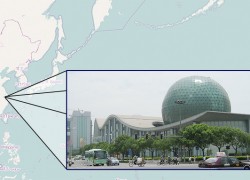
Halfway around the world in the Yangtze River Delta, a burgeoning suburb of Shanghai faces workers’ rights issues as it prepares for a new university.
The city is Kunshan, and the university is Duke U’s 200-acre China campus, construction of which was slated to begin last month, Gregory Jones, vice president and vice provost for global strategy and programs, wrote in an e-mail. Buildings on 35 of the 200 acres are scheduled to be operational by January 2012, Jones added.
Halfway around the world in the Yangtze River Delta, a burgeoning suburb of Shanghai faces workers’ rights issues as it prepares for a new university.
The city is Kunshan, and the university is Duke’s 200-acre China campus, construction of which was slated to begin last month, Gregory Jones, vice president and vice provost for global strategy and programs, wrote in an e-mail. Buildings on 35 of the 200 acres are scheduled to be operational by January 2012, Jones added.
“We have found our relationship with the city of Kunshan to be a very positive and constructive relationship and we have high confidence in their visions for their city,” Jones said. Initially the campus will house graduate school programs, primarily in the Fuqua School of Business, but other parts of the University plan to use the facilities in the future.
Duke is interested in the region largely because of its economic potential, but some of the region’s factories have recently come under fire over treatment of their workers.
Jones led a delegation of about 10 people to Kunshan the week of June 7. The delegation, which included several graduate school deans, met with the mayor, vice mayor and other city leaders. Kunshan officials believe the campus is integral to the city’s continued development, Jones said.
The city is one of the most economically successful county-level regions in China. Manufacturing has taken on a stronger role in the region, which was originally agricultural. Kunshan has attracted investors from multiple countries, most notably Taiwan. More than 55 countries and regions have established around 5,500 projects in the city, according to the city’s website.
“There’s enormous development going on in parts of the city, high rise after high rise for housing or business, it’s just incredible,” said Steve Nowicki, dean and vice provost of undergraduate education who was also on the recent trip to the site.
As the region’s economic capacity increases, however, companies have seen an increase in labor concerns.
Taiwanese-funded KOK Industrial became the site of a workers’ strike June 7. Of 2,000 protesters at the rubber products plant, 50 were injured after clashing with security guards in the street, The China Daily reported June 9. Although the strike occurred while the Duke delegation was in China, Jones said the University did not address the event with officials. The delegation did not learn of the strike until after meeting with Kunshan leaders, he added.
Kunshan is also the location of a Foxconn branch that employs thousands of workers. Foxconn—another Taiwanese-run company that manufactures electronics for Apple, Hewlett-Packard, Sony, Dell and other companies—increased base wages by about 65 percent last month after 11 employees committed suicide allegedly because of poor working conditions and low pay.
“There’s clearly concern and we regularly engage in conversation about engaging Chinese culture and concerns, but we also have to respect the autonomy of their own government,” Jones said, adding that the University would become involved if a situation were to directly affect the campus.
Duke did recently communicate with Chinese officials regarding cyberattacks earlier this year on Google that may be linked to Shanghai Jiao Tong University, Duke’s partner in building the Kunshan campus.
“We asked questions and we were satisfied with the responses that we got,” Jones said.
It may never be clear if SJTU was involved in the attacks, Jones added. He went on to stress the importance of being cautious in intercultural relations.
China may come with political and economic challenges, but Jones said both entities ultimately have a lot to gain from the partnership.
“[Our relationship] will make Duke a better university and it will make Kunshan a better city,” Jones said.
